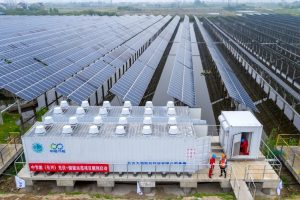New regulations on data security for electric vehicles made in China will be “very aggressive,” according to a senior Biden Administration official.
Commerce Secretary Gina Raimondo told subcommittee meetings at the US House of Representatives on Wednesday that her department aims to have the new rules on Chinese EVs and data collection and privacy unveiled by the end of the year.
“Let’s say we had a million Chinese cars on the road, all connected, all collecting data from Americans – all of that is going back to Beijing,” she was quoted saying to the subcommittee on innovation, data and commerce. “So [that is why] we are being very aggressive.”
In remarks that echoed strong warnings she gave earlier this year, Raimondo said her concerns lay in “the national security of all this data making its way back to the Chinese military.”
ALSO SEE: Indonesian Airports, Data Centres Hit By Worst Cyberattack in Years
EV data may need to be kept in the US
Decisions on the content of the rules were yet to be decided, but Raimondo said they could end up banning Chinese EVs on US roads and demanding that software on the EVs ensures that “all the data has to be housed in America.”
Given the concern over the security of data of US citizens who use TikTok being accessed by China for improper reasons, this would hardly be surprising.
Indeed, the Commerce chief told a separate subcommittee (on Energy & Commerce) that “the more she learns about the ability for surveillance by advanced cars, the more it scares her,” a report by International Trade Today said.
It quoted Raimondo telling a Republican panel member: “In the most extreme case, we could say no Chinese connected vehicles allowed in America. We could say the software has to be American made. We could say the data has to reside in the US.”
And the regulations may affect cars assembled in countries other than China, such as Mexico, and even the United States – if the company that owns the carmaker is Chinese, such as Volvo and its subsidiary Polestar, which are already making cars in South Carolina.
Raimondo said the department was reviewing public comments on security risks of connected vehicles to get a better understanding of how cars communicate with external systems, as well as how they capture data, and if they have a remote capacity to manipulate or disable other vehicles.
Chips, ships and drones
Meanwhile, other members of Congress had a lot more than just Chinese EVs on their minds this week.
At a third hearing, involving the House select committee on China, lawmakers discussed tackling their top rival’s dominance in computer chips, shipbuilding and drones, according to a report by the South China Morning Post.
Christopher Miller, the author of the book ‘Chip War’, told the panel that China had poured subsidies worth billions into low-tech semiconductors used in multiple products, and said he anticipated China would increase its share of the market for “foundational chips” in the years to come.
New investment restrictions, similar to those imposed by the Biden Administration on advanced chips used for artificial intelligence (or military use), should target these low-end chips, Miller recommended.
At the same meeting, Raja Krishnamoorthi, a senior Democrat from Illinois, suggested that the US needed to revive and modernize an import protection mechanism known as section 421 that expired in 2013, so they could impose short-term tariffs to manage market disruptions caused by a sudden increase in cheap imports from Chinese manufacturers.
He said US companies could not compete with cheap products such as drones made by DJI, which were less than a third of the cost of drones made by one drone-maker in California, which was forced to shut down.
Other lawmakers noted China’s huge shipbuilding capacity and said they supported demands by labour unions for the US to impose substantial docking fees on Chinese vessels, because that sector was also heavily subsidized by Beijing.
All up, it was not a great week for bilateral dealings.
- Jim Pollard
ALSO SEE:
US House Backs Ban on Drones Made by China’s DJI – TH
Chinese Firms Seen Shifting Production Abroad to Avoid US Tariffs
Double or Quadruple, Biden Tariffs Won’t Really Hurt China
US ‘Pressured’ Mexico to Reel Back China EV-Maker Incentives
China’s BYD Confirms Mexico Factory Plan But Rules Out Exports
US Auto Sector ‘Faces Extinction’ From Chinese Mexico Imports
Biden Orders Probe Into Data Security Risks From Chinese EVs
Raimondo Says Chinese EVs Are a National Security Risk For US, EU






















